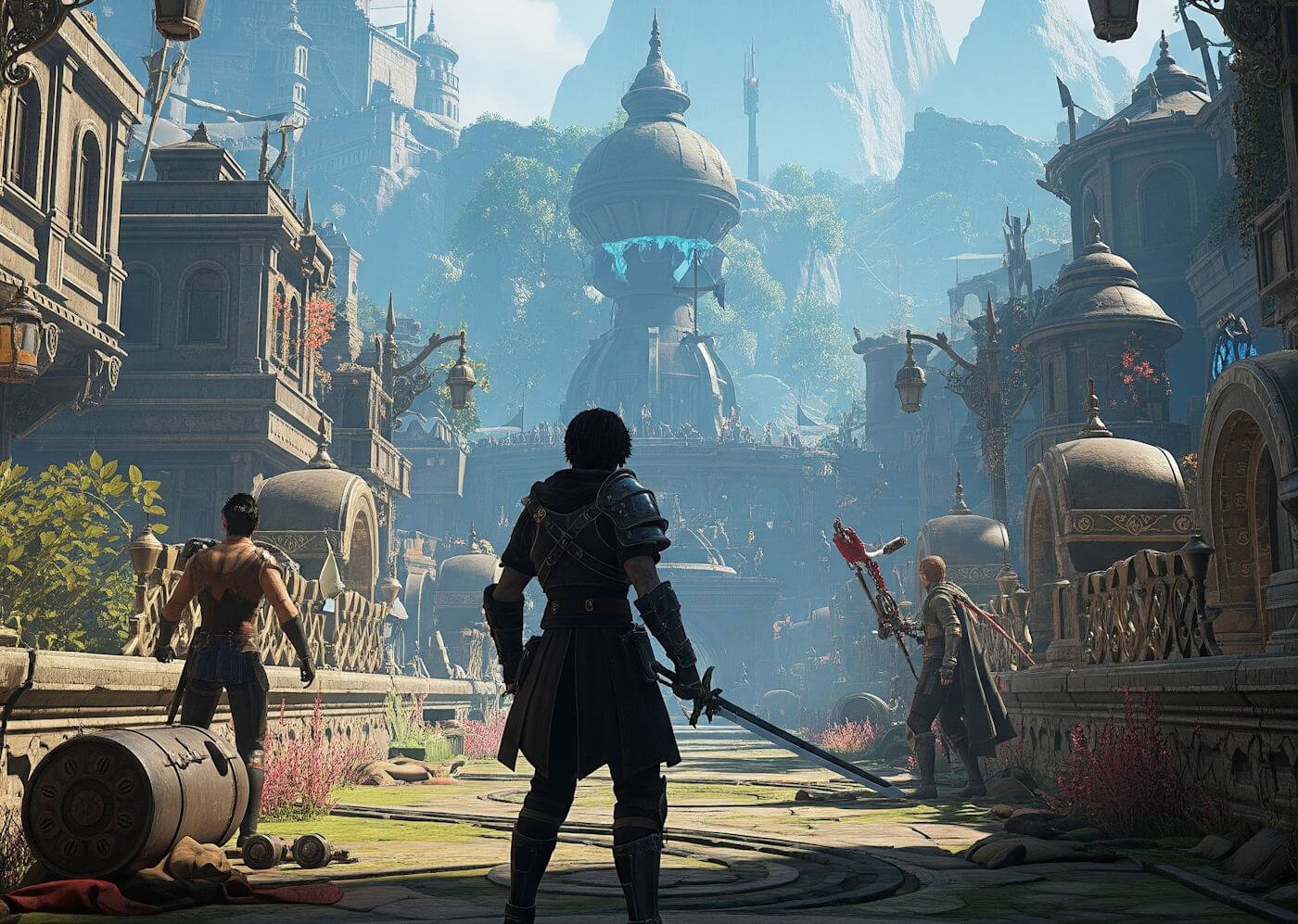Would Your Favorite Game Still Be Great Without Music?
Introduction to Music in Gaming
Music has been an integral part of video gaming since its inception, serving not only as an accompaniment to the visual experience but also enhancing player engagement and emotional connection. The historical evolution of music in gaming can be traced back to the early days of arcade machines, where simple bleeps and tones formed the soundtracks of classic titles. As technology advanced, so too did the complexity and richness of game music, allowing composers to craft intricate scores that elevate the gaming experience.
With the introduction of 16-bit sound capabilities in the early 1990s, video game music began to take on a new layer of sophistication. Iconic soundtracks from titles such as “The Legend of Zelda” and “Final Fantasy” are testament to the significant role that music plays in creating immersive worlds. These compositions not only serve to entertain but also help to convey narratives, provoke emotions, and enhance gameplay dynamics. The synergy between music and gameplay can be seen in how music cues enhance moments of tension, joy, or sorrow, allowing players to feel more deeply connected to the storyline and characters.
The role of music in gaming extends beyond mere background noise; it shapes player experiences, influences moods, and ultimately impacts how players interact with the game. As the industry continues to evolve, the use of adaptive music, which responds dynamically to gameplay changes, showcases a more sophisticated level of engagement. This evolution prompts the question of whether a game could maintain its appeal if stripped of its musical elements. The examination of this topic is essential to understanding why soundtracks not only complement but define the essence of many beloved games.
The Emotional Impact of Game Soundtracks
The integration of music in video games serves as a powerful catalyst for emotional engagement, enhancing the player experience significantly. Numerous psychological studies have shown that music can evoke a wide range of emotions, which are often intricately tied to narrative elements and character development within a game. A well-composed soundtrack not only complements gameplay but also deepens the player’s connection to the storyline and the characters inhabiting that world.
Research indicates that specific musical scores can trigger emotional responses that resonate with personal experiences. For example, a melancholy tune may enhance the feeling of loss during a pivotal plot point, while an intense orchestral piece can elevate adrenaline during a high-stakes battle. This emotional layering transforms gameplay into a more immersive experience, allowing players to feel a profound connection to fictional events and characters. Such emotional investment can heighten engagement, translating into a more memorable gaming experience.
The soundtracks of popular games often reflect a careful balance between musical themes and gameplay mechanics. Composers use motifs to symbolize character arcs or key moments, which can create a rich tapestry of sound that players associate with their journey. Moreover, players frequently report that certain songs from their favorite games continue to evoke nostalgia long after they have finished playing. This lasting emotional resonance signifies the importance of music as a storytelling vehicle within the gaming landscape.
Ultimately, the emotional impact of game soundtracks is not merely ancillary; it is fundamental in shaping the overall experience. Without well-crafted music, any game’s narrative depth and emotional storytelling could be diminished, leaving players less invested in the effects of their actions and choices. The significance of soundtracks in gaming is a dynamic alliance that transforms the act of playing into a deeply felt experience.
Case Studies: Iconic Game Soundtracks
The relationship between music and gaming is often highlighted through the immersive experiences created by iconic soundtracks. Games such as The Legend of Zelda, Final Fantasy, and Celeste serve as prime examples of how music develops emotional connections, enhances gameplay, and ultimately shapes a game’s identity.
The Legend of Zelda series, a hallmark of the action-adventure genre, features compositions by Koji Kondo that have become synonymous with gaming itself. The iconic theme evokes nostalgia and adventure, serving not merely as background noise but as a significant part of the narrative. Each score is meticulously crafted to elevate the player’s experience, capturing the essence of exploration and the various emotions encountered throughout the game. The music’s ability to create an atmosphere transforms the game’s setting into a lively world that engages players and lingers in their memories long after the game is completed.
Similarly, Final Fantasy, known for its deep storytelling and character development, utilizes its musical compositions to enhance thematic elements and emotional depth. Composed by Nobuo Uematsu, the soundtracks vary significantly across installments, with each score tailored to amplify the game’s narrative. For example, the stirring melodies and emotional orchestral pieces serve to draw players deeper into the engaging plot, while also becoming anthems that resonate within gaming culture. These compositions evoke feelings of joy, sorrow, and triumph, establishing strong emotional ties that players remember fondly.
Lastly, Celeste‘s soundtrack, created by Lena Raine, illustrates how music can serve as a motivational force. The game’s themes revolve around personal struggles and triumphs, and the music effectively complements the gameplay, dynamically shifting to reflect the player’s progress. The evocative melodies and atmospheric tones enhance the journey of the protagonist, further solidifying the importance of music in creating a rich gaming experience.
The Role of Ambient Sounds and Effects
In the realm of gaming, music often receives significant attention for its ability to evoke emotions and set the overall tone of the experience. However, ambient sounds and sound effects play an equally crucial role in crafting an immersive environment. While music provides the emotional backdrop, ambient sounds serve to enhance realism and context within the game world. These elements combine to create a holistic sound design that effectively draws players deeper into the narrative and gameplay.
Ambient sounds, such as the rustling of leaves, distant bird calls, or the echo of footsteps in a cavern, contribute to the setting’s authenticity. They are essential in establishing the atmosphere, whether it is the calm serenity of a forest, the bustling energy of a city, or the eerie silence of a haunted mansion. By providing these auditory cues, developers can trigger specific feelings or reactions in players, making the game experience more engaging and relatable. Furthermore, sound effects, which encompass noises generated by actions or interactions, add another layer of immersion. For example, the clang of a sword against armor or the muted thud of footsteps on soft ground can heighten tension and excitement, guiding player responses in real time.
It is important to note that while music elevates the emotive narrative, ambient sounds and effects are fundamental for context and responsiveness. They work in tandem, creating a dynamic interplay that enriches the gaming experience. Without these elements, even the most beautifully composed score could seem hollow, lacking the grounding necessary for a fully realized world. Therefore, achieving a balance between music and ambient sound design is essential for developers seeking to deliver a captivating gameplay experience.
Player Experiences Without Background Music
In the realm of gaming, the absence of background music can significantly alter the player’s experience. Many gamers have expressed that without the accompanying melodies and soundscapes, the immersion in a game is substantially diminished. For instance, a gamer might recall playing a beloved adventure title that typically features a rich, orchestral score. When they attempted to play it without any background music, the game felt almost lifeless. They noted that the absence of music stripped away the emotional weight of certain scenes, making pivotal moments less impactful.
Other players echoed similar sentiments, sharing their thoughts on games where music serves not only as an aesthetic choice but as a narrative device. A first-person shooter may rely on an adrenaline-pumping soundtrack to enhance the thrill of a high-stakes battle. Without this element, players found themselves feeling less engaged, as the rhythm and energy of the gameplay were unsupported by a musical backdrop. One player remarked that in some cases, the silence was more disconcerting than engaging, leading to a lack of focus and concentration.
Moreover, testimonials from retrospective gamers highlighted how certain game soundtracks evoke nostalgia and enhance memorability. Unaccompanied gameplay felt hollow to many, lacking the emotional resonance that music brings. An individual might recall exploring a vast open world, yearning for a familiar soundtrack that enriches exploration; they noted the absence made the vast landscapes seem dull and uninviting.
Overall, the insights from gamers emphasize that music in gaming plays a critical role in shaping their experiences. The emotional connections, sense of engagement, and immersive environments fostered by soundtracks distinctly enhance a player’s enjoyment, making the absence of music a noticeable void that diminishes the overall gaming experience. The interplay of sound and gameplay dynamics can determine whether a gaming session is memorable or merely forgettable.
The Freedom of Musicless Gameplay
While music undoubtedly plays a vital role in enhancing the gaming experience, there exists a distinct group of players who prefer musicless gameplay. This preference often stems from a desire for heightened focus and concentration, particularly in genres where strategic thinking and problem-solving are paramount. Puzzle games, for instance, frequently advocate for a more subdued auditory landscape, allowing players to immerse themselves fully in solving intricate challenges without the distraction of a soundtrack.
In the realm of strategy games, many players find that the absence of music can create an atmosphere conducive to deep thought and analysis. These games often require players to meticulously plan their moves, anticipate opponents’ reactions, and manage resources effectively. When music is absent, players can engage more intuitively with the game mechanics, appreciating the intricate details and nuances that might be overshadowed by an immersive score. For those who thrive in a quieter environment, the freedom to play without music can enhance cognitive clarity and overall enjoyment.
Moreover, the experience of being immersed in a game without any musical accompaniment fosters a unique relationship with the gameplay. For instance, many players report finding themselves lost in the ambiance and the sound effects—the clinking of puzzle pieces, the rustling of in-game environments, or the various audible cues that accompany gameplay actions. This type of auditory environment allows them to interact with the game on a different level, focusing solely on the mechanics and the visual elements rather than being influenced by a predetermined emotional score.
Ultimately, while music undeniably elevates gaming experiences for many, the option of musicless gameplay serves as proof that the absence of a soundtrack can lead to an equally engaging and rewarding experience. Each player’s preferences vary, reflecting the diverse ways individuals interact with video games.
Developers’ Perspectives on Music Integration
Game developers often view music as an essential element that augments the gaming experience, shaping how players interact with the virtual world. By integrating a carefully crafted soundtrack, developers aim to elicit specific emotional responses that enhance gameplay. This creative process is not merely an afterthought, but rather an integral part of the game’s design that requires close collaboration between composers and the development team. Each musical piece is strategically designed to reflect the narrative, setting, and overall tone of the game, ensuring that players remain immersed in the experience.
When embarking on the creation of a game soundtrack, developers must first understand the fundamental aspects of the game’s theme and story. For many, it’s imperative that the music not only complements the visuals but also supports the game’s mechanics and pacing. Composers often engage with the narrative arc, seeking ways to use music to enhance character development and plot progression. This complex interplay is why many developers consult with sound experts and music composers early in the creative process.
However, crafting music for games comes with its own unique set of challenges. Different genres of games require varied approaches to music integration. For example, a horror game may rely on atmospheric sounds to build tension, while an action-packed title might use fast-paced rhythms to keep the adrenaline high. Developers must also consider technical constraints, as the audio needs to be seamlessly incorporated into the game without hindering performance or the player’s experience. Furthermore, in a landscape where player feedback is paramount, developers may find themselves re-evaluating the music continuously to ensure it resonates with the audience. The intricate relationship between game genres and music often highlights the necessity of adapting techniques to meet diverse expectations.
Future of Music in Gaming
The future of music in gaming is poised for remarkable evolution, driven by emerging technologies and innovative trends that are transforming players’ experiences. One significant development is the rise of adaptive soundtracks, which allow game music to respond dynamically to a player’s actions and the evolving narrative. This technology uses algorithms to determine which musical elements to incorporate based on various in-game conditions, thereby creating a tailored and immersive audio experience. Players can find themselves deeply engaged in gameplay as music shifts in intensity and style, enhancing emotional responses and reflecting personal achievements throughout their journey.
Another noteworthy trend is the incorporation of artificial intelligence (AI) in music composition for video games. AI-generated compositions are becoming increasingly sophisticated, capable of producing original soundtracks tailored to a game’s specific context. This technology not only streamlines the development process but also provides indie developers with high-quality music options that were previously available only to larger studios. As AI continues to evolve, it could lead to diverse and unique soundscapes that enrich the gaming experience, ensuring that each playthrough feels fresh and personalized.
The rise of indie game soundtracks cannot be overlooked, as independent developers increasingly prioritize the role of music in their projects. Many indie games feature exceptional soundtracks that offer players unique auditory experiences while often reflecting the game’s thematic elements and emotional depth. As these titles gain popularity, the music within them receives recognition and appreciation, resulting in a burgeoning market for indie game soundtracks. With the continued growth of gaming communities and interactive platforms, it is likely that the fusion of music and gaming will carry substantial implications for how future games are designed, played, and experienced.
Conclusion: Music’s Role in Defining Greatness in Games
Throughout this discussion, we have explored the profound influence that music has on the gaming experience. The soundtracks and scores serve not only as background accompaniment but also as critical elements that shape the emotional landscape of a game. Music has the unique ability to enhance the narrative, heighten tension during gameplay, and create lasting memories associated with specific moments. This auditory experience reinforces the atmosphere, making players feel more immersed in the game world, which enhances overall enjoyment.
We examined how iconic themes and well-composed scores can evoke nostalgia, connecting players to memories of their favorite gaming moments. Many gamers recall the exhilarating sensation of battling a formidable enemy while an intense orchestral piece amplifies the experience. By integrating music with gameplay mechanics, developers effectively utilize sound to elevate the connection between the player and the game. It is clear that to categorize a game as truly great, one must consider its musical composition alongside its visual and interactive elements.
Furthermore, we have seen how different genres of games call for distinct musical styles that enhance their inherent qualities. Whether it is the eerie ambient sounds in survival horror games or the uplifting melodies in adventure games, the right music contributes significantly to the overall atmosphere. As such, the relationship between music and gaming becomes not just complementary, but essential to the defining characteristics of what makes games enjoyable and memorable.
As we reflect on our own favorite games, it is vital to consider how music has enriched our experiences. Does the absence of a stirring soundtrack diminish the greatness of a beloved title, or does it remain impactful through other elements? This contemplation not only highlights the importance of music in gaming but also prompts us to appreciate sound as an integral component of interactive entertainment.







